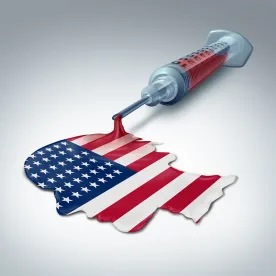On December 20, 2019, the President signed into law a bill to fund the federal government through September 30, 2020. The bill included several important health care provisions but left some longstanding policy challenges unresolved. Most notable changes to law are the elimination of three Affordable Care Act taxes and the passage of the CREATES Act. Noticeably absent is legislation related to surprise billing and prescription drug pricing. A summary of key health care provisions included in the 2020 Consolidated Appropriations Act (P.L. 116-94) follows. We will address the legislative outlook for 2020 in a separate ML Strategies blog post next week.
Taxes
Three taxes from the Affordable Care Act were permanently repealed:
-
Elimination of health insurance tax: This tax on insurers that offer fully insured health coverage was on hold in 2017, in effect in 2018, on hold again in 2019, and will be in effect in 2020—but it is permanently repealed for 2021 and beyond.
-
Elimination of Cadillac tax: This tax on high-cost health plans had been suspended previously and is now permanently repealed.
-
Medical device excise tax: This tax on device sales never went into effect thanks to temporary suspensions reauthorized by Congress several times in a row, but it is now permanently repealed.
Patient Access to Medical Products
-
Creating and Restoring Equal Access to Equivalent Samples (CREATES) Act: The CREATES Act, which by one measure was 10 years in the making, is now law. CREATES makes it easier for generic drug and biosimilar manufacturers to get samples from brand biopharmaceutical companies for purpose of testing the follow-on product against the brand. Results from those tests are needed to support Food & Drug Administration (FDA) marketing applications for generic drugs and biosimilars. Proponents of the legislation call it a commonsense step towards promoting competition and lowering drug prices by making it easier to develop follow-on drug products. Specifically, the CREATES Act establishes a private cause of action that permits a generic or biosimilar product developer to sue the brand manufacturer to compel it to sell the necessary samples on “commercially reasonable, market-based terms.” Under the leadership of former FDA Commissioner Scott Gottlieb, the agency rolled out Drug Competition and Biosimilar Action Plans (see prior Mintz coverage here) that strongly advanced policies that would “reduce gaming of FDA requirements or other attempts to unfairly delay competition.” It will be interesting to watch if and how the new CREATES Act provisions change the behavior of both brand and follow-on product developers, and also whether and to what extent it affects prescription drug prices. It is fair to say, however, that cost savings expected from this new law, if any materialize, are nowhere near those promised by more sweeping drug pricing legislation still under discussion in Congress and among stakeholders.
-
Protecting Access to Wheelchairs Act: This law improves access to complex rehabilitative manual wheelchairs by excluding them from the Medicare competitive acquisition program.
Reimbursement Policy
-
Laboratory Access for Beneficiaries (LAB) Act: The LAB Act delays by one year the required reporting of lab payment data under the Protecting Access to Medicare Act (PAMA), giving labs sufficient time to implement systems required to collect information required to be reported to the Centers for Medicare & Medicaid Services (CMS). The bill also allows for CMS to explore more effective methods of data collection for the use of rate setting.
-
Patient Access to Cellular Transplant (PACT) Act: This law improves parity between Medicare reimbursement policies for certain bone marrow, cord blood, and organ transplants to ensure hospitals are adequately reimbursed for the costs associated with all types of transplants.
Extenders
A number of federal health programs were extended through May 2020, including:
-
Community health centers
-
National Health Service Corps
-
Teaching health centers
-
Special Diabetes Program and Special Diabetes Program for Indians
-
Area Agencies on Aging, Aging and Disability Resource Centers
Lastly, the spending package for 2020 also included an increase in the age to purchase tobacco products from 18 to 21 years, which became effective immediately. This significant change to the law (which caught many state governments and most businesses by surprise), however, does not preclude other legislative action related to vaping and tobacco. The Trump Administration is continuing to take action to address an increase in youth vaping, including by recently banning certain flavor pods for e-cigarettes through a new FDA enforcement policy announced on January 2, 2020.
The permanent tax repeals should allow medical device companies and others to focus their public policy efforts elsewhere, such as the next FDA user fee negotiation process that is beginning this year. Likewise, completion of the LAB Act should allow hospitals, clinical laboratories, and diagnostic manufacturers to devote significantly more attention to the long-awaited VALID Act that seeks to usher in lab test oversight reform.
The extenders and other pending health legislation (drug pricing and surprise billing, to name a few) set the stage for another health care package in May. Further, some or all of these topics could be incorporated into the Cures 2.0 effort, which could become a way for retiring Senator Lamar Alexander to make a final mark on the nation’s health care programs in his role as chairman of the Senate HELP Committee.



 />i
/>i

